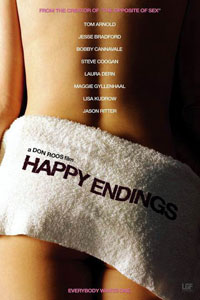Happy Endings (R) ★½
 Despite quite a grim and morose opening sequence, Happy Endings is a comedy, ''sort of.'' That's what they tell us, anyway, in pop-up titles immediately following the opener--the first of many cardinal cinematic sins committed throughout the film. Employing the oldest indie trick in the book of interweaving complex, seemingly separate stories together, the film is a tired cliché from the get go.
Despite quite a grim and morose opening sequence, Happy Endings is a comedy, ''sort of.'' That's what they tell us, anyway, in pop-up titles immediately following the opener--the first of many cardinal cinematic sins committed throughout the film. Employing the oldest indie trick in the book of interweaving complex, seemingly separate stories together, the film is a tired cliché from the get go.
Story
You know you're in trouble when the terse, ironically un-ironic supplementary notes are introduced, hogging up half the screen--the cheapest way, literally and figuratively, to help tell a story. Then we get into the meat of the movie. Mamie (Lisa Kudrow) meets and is subsequently blackmailed by a struggling filmmaker (Jesse Bradford), who claims to know the whereabouts of her 20-year-old estranged son; Charley (Steve Coogan) and his boyfriend, Gil (David Sutcliffe), think that their best friends, Pam (Laura Dern) and her girlfriend, Diane (Sarah Clarke), are lying about using Gil's sperm; and Otis (Jason Ritter), a young gay man, tries to stave off the suspicions of his father (Tom Arnold) by ''dating'' the neighborhood leech, Jude (Maggie Gyllenhaal), only to find out that she's really after his father's money. Whew! And just when you think each ''separate'' story can't get any more convoluted, tangential sub-stories emerge. Plus, you've got those notes that keep popping up telling the audience how to feel. We will begrudgingly resist the obligatory--and in this case not-so-friendly--play on words the title invites.
Acting
To Happy Endings' credit, the acting is quite good. In fact, it's the film's saving grace and perhaps its only redeeming quality. Kudrow--doing nothing to dispel the theory that the only post-Friends cast member getting any legitimate film offers is Jennifer Aniston--at least turns in another fine dramatic performance as the hard-luck Mamie. Coogan (Around the World in 80 Days) proves himself incapable of bad work, with his take as a modern-day cynic. Gyllenhaal, although still stellar with her enigmatic, sultry trademark (not to mention the eyes), might be moving dangerously close to being typecast as the sexual deviant she started in Secretary (not that we're complaining). Ritter, son of the late John Ritter, is surprisingly strong as a conflicted teenager torn between his father's expectations and his own, while Bradford (Swimfan), quickly becoming a veritable indie veteran, gives a powerful performance as the ambiguous filmmaker (an unintentional running theme throughout). But the breakout performance, oddly enough, comes from Arnold. The actor, who is most often associated with belligerence and baaaadcomedies, as well as the whole Roseanne saga, plays it down considerably as Frank, a long-suffering widower and single parent, who has too much money and not enough love. He'll the surprise the dozens who will turn out to see the film.
Direction
Writer-director Don Roos has had his hand in nine feature films now--mostly as a writer--but is most revered for writing and directing 1998 critically acclaimed dark comedy The Opposite of Sex. Those stellar, subtle techniques he displayed in Sex, however, are hard to spot in Happy Endings. Clearly, Roos has a penchant for complex storylines, but more isn't always better. Trying to bring together such stories tenuous to begin with by way of mere coincidence doesn't work. The use of the split-screen ''addendums''--so to speak--that pop up throughout the film are a collective cop-out. They distract, detract and alienate audiences more so than even subtitles because the tidbits are stream-of-consciousness. Plus, they reveal integral pieces of information with a certain unsuccessful flamboyance. This technique is usually only used on the most rudimentary filmmaking/screenwriting level. And with all of the script's vigorous efforts trying to remove us so far from the inevitable, the end is still incredibly anti-climactic and predictable.
Bottom Line
Probably conceived in hopes of becoming this summer's miracle baby, Happy Endings, a film that's independent in budget but greedy in expectation, is as confused as its characters. As the indie ''gimmicks'' fail, the movie's soul--for better or worse--is also completely lost in the process.
To get the full Quicklook Films experience, uncheck "Enable on this Site" from Adblock Plus
box office top 10

Civil War Released: April 12, 2024 Cast: Kirsten Dunst, Wagner Moura 11.1M

Abigail Released: April 19, 2024 Cast: Melissa Barrera, Dan Stevens 10.2M

Godzilla x Kong: The New Empire Released: March 29, 2024 Cast: Rebecca Hall, Brian Tyree Henry 9.5M

The Ministry of Ungentlemanly Warfare Released: April 19, 2024 Cast: Henry Cavill, Eiza Gonzalez 9M

Spy x Family Code: White Released: April 19, 2024 Cast: Takuya Eguchi, Saori Hayami 4.9M

Kung Fu Panda 4 Released: March 8, 2024 Cast: Jack Black, Viola Davis 4.6M

Ghostbusters: Frozen Empire Released: March 22, 2024 Cast: Paul Rudd, Carrie Coon 4.4M

Dune: Part Two Released: March 1, 2024 Cast: Timothée Chalamet, Rebecca Ferguson 2.9M

Monkey Man Released: April 5, 2024 Cast: Dev Patel, Sikandar Kher 2.2M

The First Omen Released: April 5, 2024 Cast: Nell Tiger Free, Bill Nighy 1.7M






